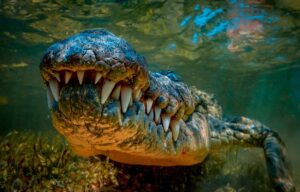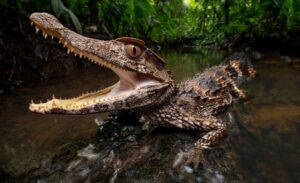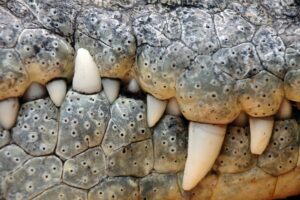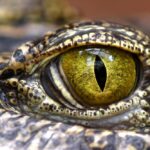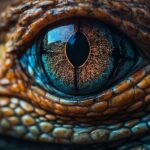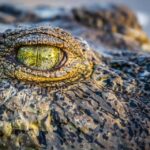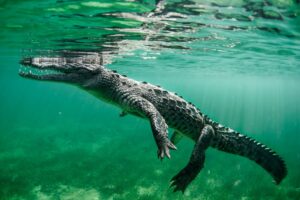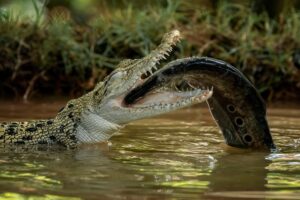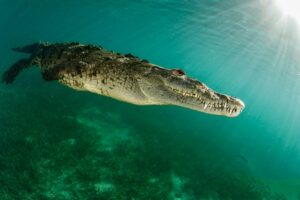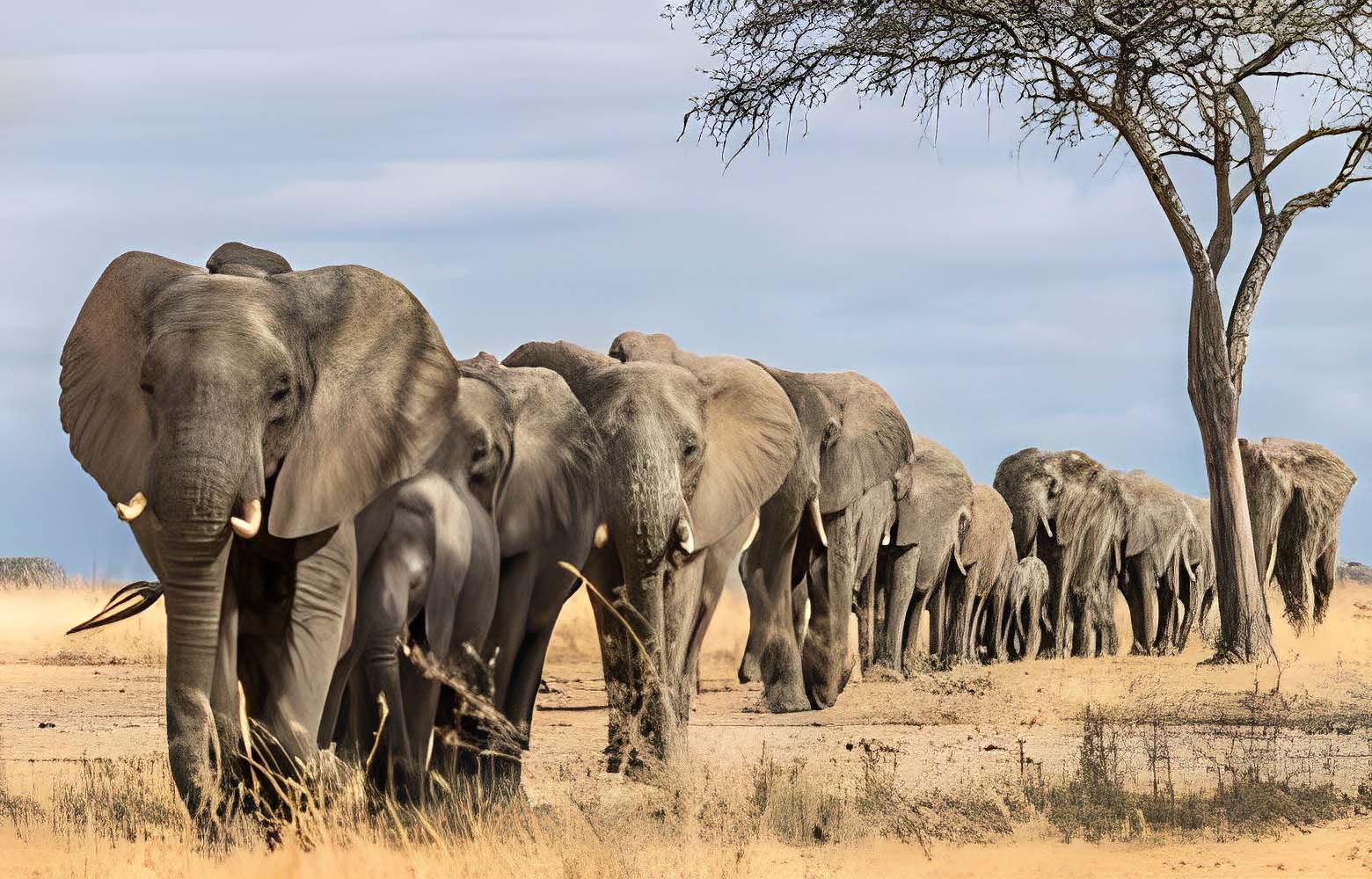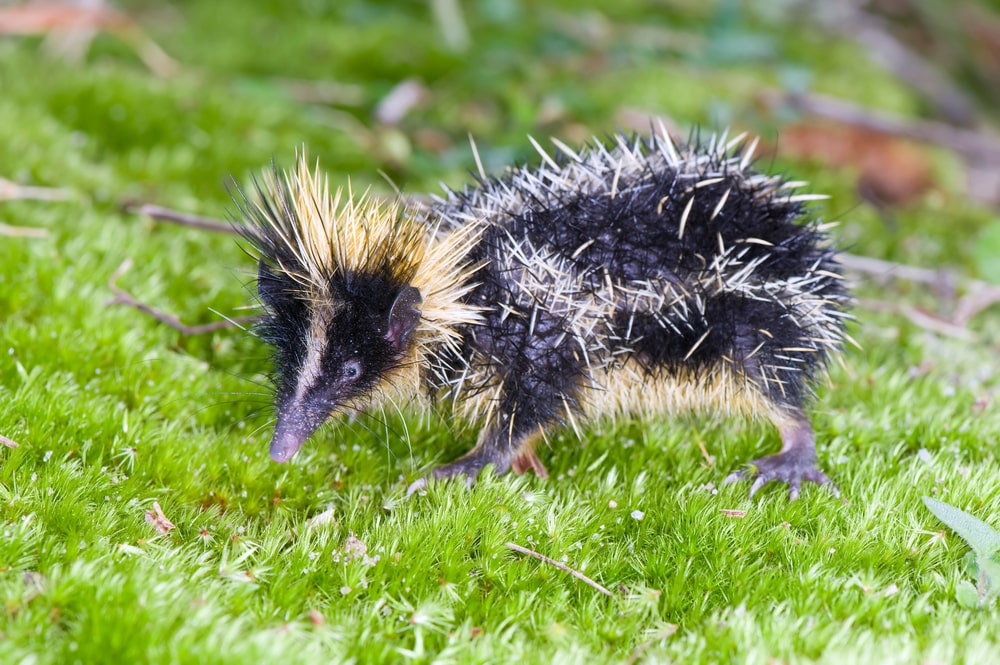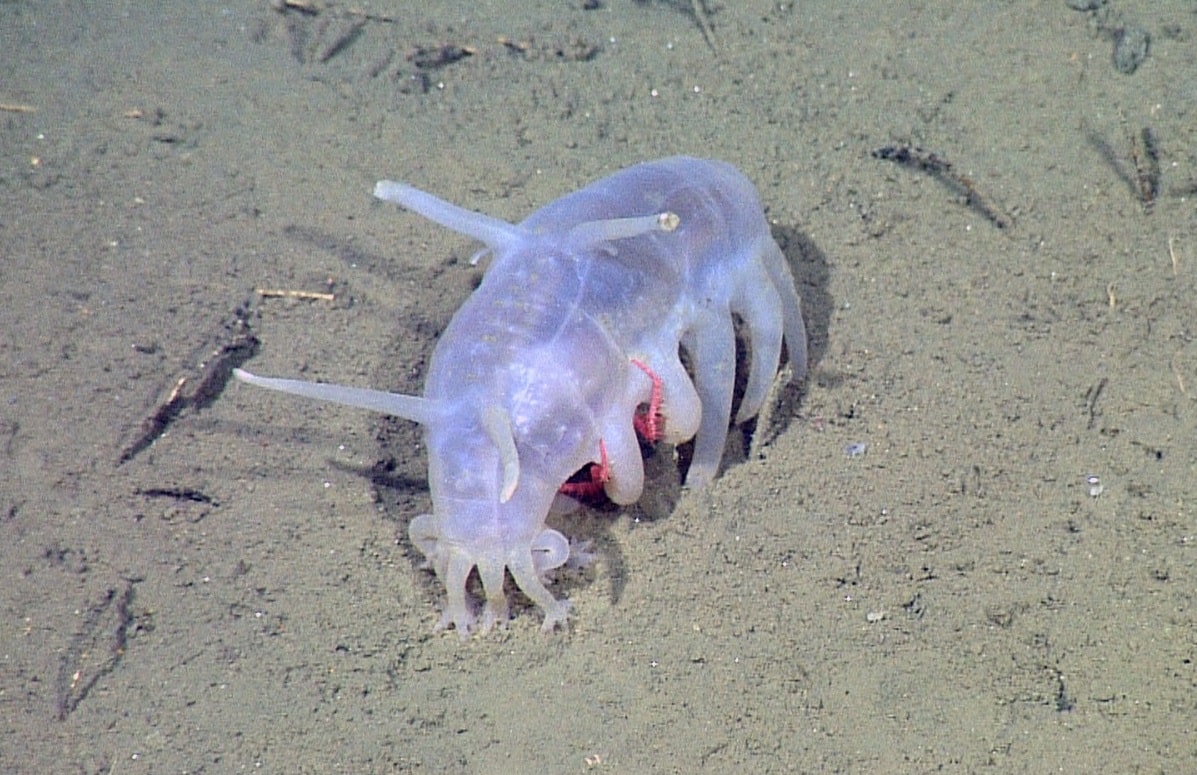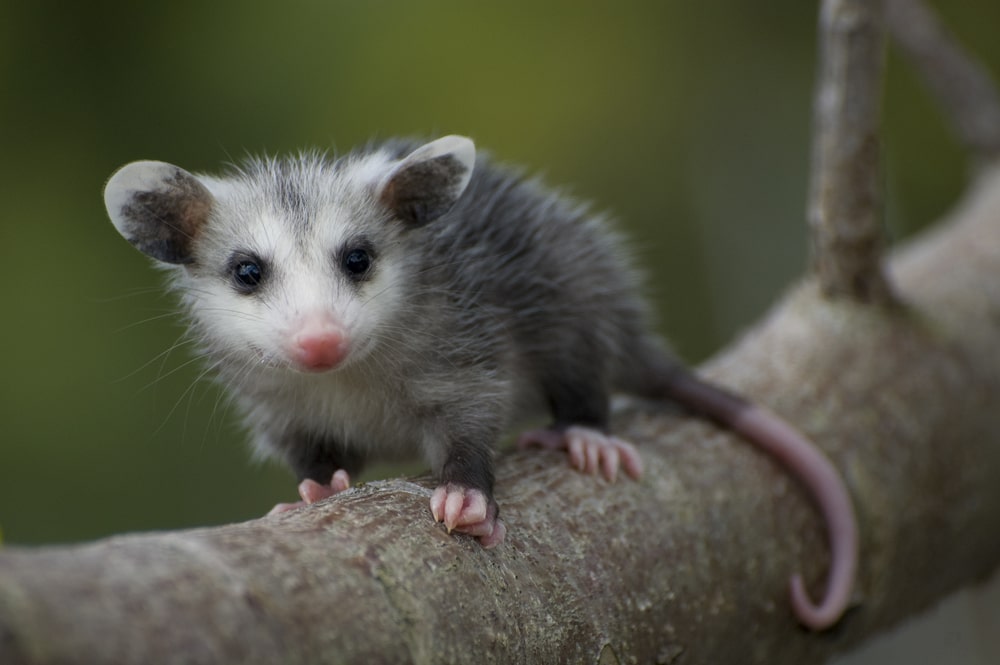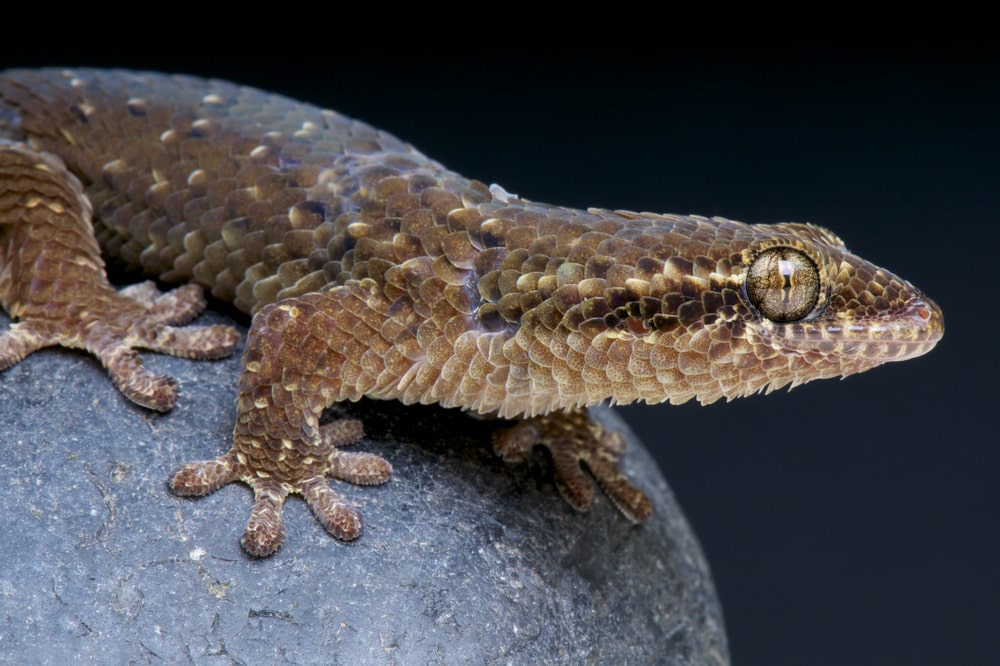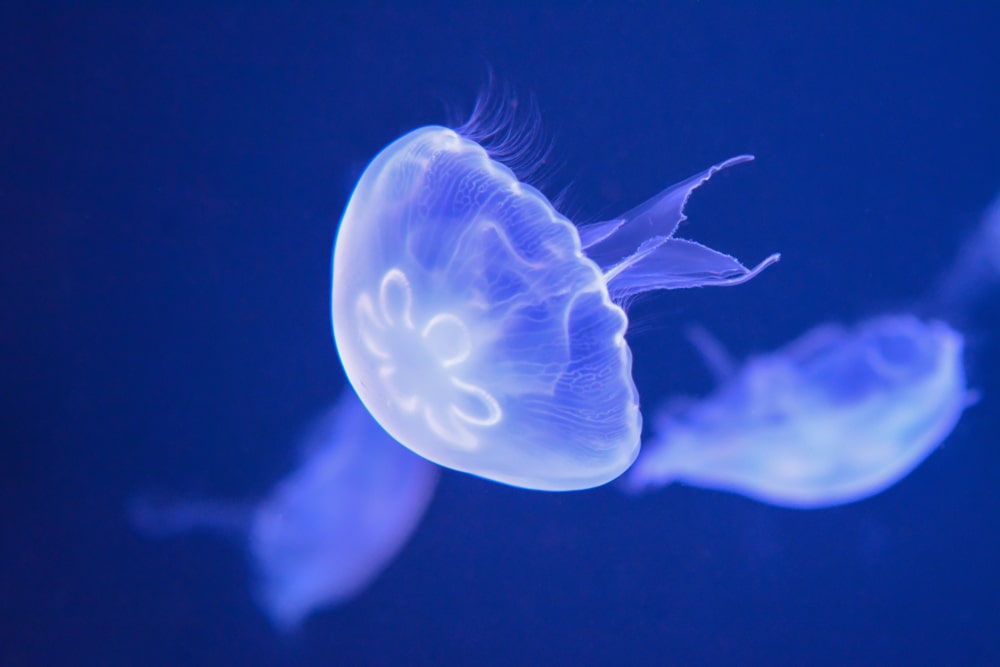Why Are Crocodiles So Merciless? Evolutionary Adaptations
Evolutionary Adaptations
The crocodile’s reputation as merciless predators is honestly well-earned, but their ruthless behavior might not be a product of cruelty, but actually a testament to their remarkable evolutionary adaptations. Let me explain.
One of the most striking adaptations of crocodiles is their mastery of ambush predation. Their mottled skin blends seamlessly with the water and vegetation, allowing them to lie in wait, undetected, for unsuspecting prey.
This strategy conserves energy and increases the likelihood of a successful hunt, as prey ventures closer, unaware of the lurking danger. When a target presents itself, the crocodile springs into action with explosive speed and power. Their jaws, among the strongest in the animal kingdom, can exert immense crushing force of around 3700 PSI, capable of shattering bones and tearing flesh. Their teeth, razor-sharp and conical, are designed to pierce and grip, ensuring that prey is firmly secured.
The crocodile’s armored hide provides an impenetrable defense against predators and environmental hazards as well. The bony plates that form their armor are embedded in their skin, creating a shield that is both flexible and resilient. This protection has been crucial for their survival in various habitats, from the harsh African savanna to the murky depths of swamps. In addition to their physical prowess, crocodiles possess a remarkable ability to conserve energy.
Their metabolism is remarkably low, allowing them to survive on infrequent meals. This adaptation is particularly advantageous in environments with limited food sources, where crocodiles may go weeks or even months without a substantial meal. The merciless behavior of crocodiles, while seemingly brutal, is a direct result of their evolutionary adaptations. These adaptations have enabled them to dominate their ecosystems for millions of years, proving their extraordinary resilience and flexibility.
You could say that the crocodile is genuinely made to kill.
Solitary life of Crocodiles
The crocodile’s solitary nature, lack of complex social structures and interactions beyond mating and nesting behaviors, play a significant role in shaping their mercilessness as well. The absence of social learning among crocodiles limits their ability to acquire and refine hunting skills through observation and collaboration. Unlike social predators that rely on cooperative hunting strategies, crocodiles rely primarily on their individual instincts and experiences to capture prey.
This lack of knowledge sharing contributes to their mercilessness, as they may not develop more nuanced or strategic hunting techniques. Solitary living may also lead to reduced empathy among crocodiles. Without forming strong social bonds or relying on cooperation for survival, they may not develop the same level of concern for the well-being of other individuals. This reduced empathy could explain why crocodiles appear to lack remorse or hesitation when inflicting harm on their prey.
Alligator OR Crocodile?
Unconstrained by the need to coordinate hunting strategies with other individuals, crocodiles focus on maximizing their own food intake, regardless of the species or size of their prey. This opportunistic approach further contributes to their ruthlessness, as they seem to show little regard for the welfare of their prey. Intense competition for limited resources, such as food and territory, is another consequence of crocodile’s solitary lifestyle.
In a world where survival depends on individual success, crocodiles may resort to increased aggression and ruthless behavior to secure resources and protect their territory. This competitive drive may further fuel their perceived mercilessness.
Role in ecological balance
The crocodile’s predatory behavior, while merciless, serves as a vital force that regulates prey populations and shapes the dynamics of their environment. Their predation helps maintain the balance of herbivore populations, preventing them from consuming excessive vegetation and disrupting the ecosystem’s equilibrium. Beyond population control, crocodiles’ selective predation promotes the survival of healthier and more resilient prey populations.
By targeting weaker, diseased, or injured individuals, they ensure that the strongest and most adaptable individuals thrive. This selective predation contributes to the overall health and diversity of the ecosystem, fostering a population of robust prey species. Crocodiles play a vital role in nutrient cycling, transferring nutrients from aquatic environments to terrestrial ecosystems. Their consumption of aquatic prey and subsequent deposition of feces on land introduce essential nutrients into the soil, enriching the terrestrial environment and supporting plant growth.
Crocodiles behavior
Crocodiles’ burrowing behavior and nest construction create important habitat structures for a variety of species. Their burrows provide shelter and nesting sites for other animals, while their nests serve as nurseries for fish and other invertebrates. These habitat structures enhance the diversity of the ecosystem and provide essential refuges and breeding grounds for various species. In addition to their role in shaping habitat structures, crocodiles contribute to maintaining water quality in aquatic ecosystems.
Their consumption of decaying organic matter and their role in nutrient cycling help prevent the accumulation of pollutants and maintain the overall health of aquatic habitats. This contribution to water quality is essential for the survival and well-being of aquatic species and the overall health of the ecosystem. So, the ruthlessness of a crocodile might be a necessary evil.
Dietary Preference
The ruthlessness of crocodiles is accentuated by their adaptability in terms of prey selection as well. Unlike many predators with specific dietary preferences, crocodiles are known for their opportunistic feeding habits, allowing them to consume virtually any prey that comes within their reach. One key aspect of the crocodile’s predatory prowess lies in its ability to thrive in diverse aquatic environments. Whether lurking in freshwater rivers, brackish estuaries, or coastal saltwater habitats, crocodiles display an extraordinary capacity to adapt to different ecosystems.
This adaptability extends to their diet, as they can target a wide range of animals inhabiting these varied environments. Fish navigating the water’s edge, birds seeking refuge along the shore, or mammals venturing close for a drink all are potential prey for the opportunistic crocodile. Furthermore, the sheer audacity with which crocodiles approach their meals contributes to the perception of ruthlessness.
Unlike some predators that may exhibit more caution or selectivity in their hunting, crocodiles are known to strike without hesitation. This bold and fearless approach, coupled with the ability to consume a wide array of animals, further solidifies the crocodile’s position as a relentless and opportunistic predator.
Human Perception
The perception of crocodiles as merciless creatures often stems from a human-centric viewpoint that imposes moral judgments on animal behavior. One notable influence is found in mythology and folklore, where crocodiles are often depicted as menacing entities. These stories, passed down through generations, frequently position crocodiles as symbols of danger or evil, reinforcing a narrative that emphasizes their ruthless and predatory nature.
The comparison between human behavior and that of crocodiles reveals an interesting paradox. Despite our advanced cognitive capacities, empathy, and societal structures, humans often exhibit behaviors that can be deemed more merciless than those of the seemingly ruthless crocodile. While the number of people dying from crocodile attacks is typically in the range of a few dozen to over a hundred deaths annually worldwide, human activity far exceeds these numbers in every way.
As we discussed, crocodiles are actually integral to maintaining ecological balance in their habitats. On the other hand, human actions have led to unprecedented environmental degradation. Deforestation, pollution, and the over-exploitation of natural resources contribute to the decline of numerous species and ecosystems.
The merciless exploitation of the environment for economic gain showcases a level of impact and cruelty that surpasses the natural behaviors of crocodiles, who primarily act in accordance with their survival instincts.
